When Rafał finally arrived to Vic Falls, I had my batteries recharged and was ready to go. Unfortunately, the package had not reached his hands and he had to wait again for a couple of days. Although the camping site and the town were pleasant, I was afraid of getting too lazy. The closer the end seemed to be, the easier it was to me to fall into procrastinating and forget about cycling. That was time to move on, together or alone.
I left the town in early afternoon, planning to stop just before the border. The road led through a game park, which supposedly hosted elephants and lions. Of course everybody would discourage me from camping there, so I asked no one about the safety. I already knew the answer. No matter how many times I had been warned of lions, I was almost sure I would meet none of them in Africa.
The traces of elephants were there, but the night passed quietly. The full moon shone over the bush from cloudless sky, illuminating it almost like during daytime. No animals, however, except for the usual broad variety of insects.
I met the elephants the following morning. They were grazing in the bush along the road. A smaller one had separated from the group and seemed not to be bothered by my presence and the camera pointed at him. The other, bigger ones, however, escaped as soon as they spotted me. That may seem hilarious that these huge animals are not scared by big and noisy cars, but escape at the sight of a quiet cyclist. Well, the cars are common sights for them, but a man on a bicycle certainly is a novelty.
The border formalities went smoothly. Botswana was the first country since the Schengen Zone where I did not need a visa and could enter for free.
If I had to describe this country in one word, it would be “flat”. I felt like cycling on a huge table, having a straight stripe of asphalt leading to the horizon and keeping me straight for hours. The experience was totally mind-numbing, and without music to listen or a book to read I had a plenty of time to think about everything, from personal things to the basics of the universe to the long list of delicious foods I missed from Poland.
On the first day the road led through game parks and I met many elephants along the road. Unfortunately, they seemed to be afraid of me and I decided not to stop and disturb these beautiful creatures. Aware of the presence of lions in the area, I contemplated camping within a huge agricultural complex, surrounded by a high fence. Eventually I found a nice place in the bush outside, just before the village of Pandamatenga. The night was peaceful, except for the morning rain which woke me up to put on the outer tent.
The next stretch of the straight road had to lead me for about 200km until the town of Nata. Knowing nothing about any water source on the way, I had to prepare for two days in the sunny heat which had made me drink seven liters the previous day. Of course, it was the perfect moment for my brand new Ortlieb water bag to start disintegrating. The plastic thread piece started to separate from the bag itself. Well, it seemed like I was a tester of a new version of these bags, made of thinner fabric. The test failed. Fortunately, the old African way of fixing water containers worked well. I cut a long stripe of rubber from an old inner tube and put it between the bag and its' lid. With many layers of rubber pressing against each other, it resealed the broken piece and I could cycle on.
There were some road works on the way and for the first time in Africa the detours in such places were covered with asphalt. Beside that and a bunch of elephants drinking from a water pool, the road was leading through pure nothing. It was just about spinning the pedals and trying not to think about the slowly passing kilometers.
At the town of Nata I checked a roadside campsite and thanked after hearing a price which would give me a room for a couple of nights back in Eastern Africa. Beside the lack of a badly needed shower, the nights in roadside bush were perfectly OK. As the full moon time had passed already, I could enjoy the view of stars in the evening. Finally both Magellan Clouds rose high enough to see them together and on one night I witnessed a beautiful meteor show with one so huge that it passed across a half of the sky before exploding into smaller pieces and leaving a turquoise afterglow.
After Nata the surroundings changed a bit. The bush grew thicker and hosted more cattle, which also meant it was often fenced by kilometers of barbed wire. Villages appeared once in a while, often providing local produce in the form of expensive tomatoes and delicious and cheap oranges.
Soon I arrived to Francistown, the second biggest city of the country, with the population of about 180 thousand people. I stocked up at a supermarket, feeling quite uncomfortable after five days of long rides in the scorching sun, while other customers wore Sunday clothes and smelled much better than me.
I left the city just to discover a new face of Botswana. Since I entered the most populous and developed part of the country, the road was surrounded by fences. Barbed wire sealed the road from the pastures tightly and there was no opening, no single gate without a chain and padlock, nothing to cross it easily except for climbing over. With bike it seemed too much work and would draw attention of too many drivers. Eventually, after over 20km I gave up. It was already dark, so I camped just by the fence. Fortunately the road had undergone a rebuild recently and the old stripe of asphalt separated me a bit from the traffic. It would also provide me with a separate lane for cycling for the next few hundreds of kilometers.
Looking at economical data one could think that diamonds and cattle are the main industries of Botswana. But I think that the biggest business was done on the production of barbed wire. Counting the number of threads in average fence, I estimated that with every kilometer ridden I passed along 22km of wire. And that was only for the fences along the road, not counting ones that cut these huge areas into smaller plots.
Some 2574km of barbed wire later I was faced by the same problem: find a place to sleep. Fortunately, there was a side road going left, which cut across the railway track which had been there since Francistown. Just next to the rails I found an open gate and quickly disappeared in the bush. That was the tactic I used on the following two nights.
At the town of Palapye I looked for a shower. The motels would charge me a full rate of a room, the gas stations had no facilities, but finally someone pointed towards the bus station. A paid toiled was equipped with a proper bathroom. Feeling cool water on my body, on the eighth day of cycling over 100km on average in the heat, it was almost religious experience. The clothes I washed and put back again on my body, just to have them dry a couple of minutes after stepping out into the sunshine.
I felt like I had enough of that country. With zero attractions and difficulty of having the most basic needs fulfilled, I was not having fun anymore. Eventually I decided to skip the capital and turned just before Gaborone towards a small border crossing in Sikwane.
It seemed like I was quite a curiosity for the border control crew on both
sides. I got my passport stamped and entered the final, 25th country on my way:
South Africa. There was a group of policemen sitting at the post, seemed to be
bored by almost zero work. They got interested in the strange visitor.
“Hello! Where are you going?”, was the standard opener number one, which I had
heard millions of times.
“Hello! I'm going to Cape Town.”
“Hahahahahahaha! On a bicycle? It's impossible! Where do you come from?”, was
the standard reaction number one.
“I'm from Poland.”
“OK, but where do you come from on the bicycle?”
“From Norway.”
“From WHERE?!”, it was the moment when the conversations became more
interesting and varied. After asking me about the number of kilometers, months
and spare tyres used, people usually inquired about some non-standard things.
The policemen also wanted to try riding my bike. Although I'm usually not
enthusiastic about it, the sight of a tough guy in an uniform wobbling on my
vehicle is always irresistible. Soon a freebie in a form of deep-frozen bottle
of water landed in my hands and I hopped on the bike.
“Are you cycling? Don't you want a lift? We can stop a car for you”, offered
the officer.
“No, you remember: all the way on bicycle. I'm cycling”, I replied.
“OK, good luck then. The road is gravel.”
“Gravel?!”, I could not believe.
Well, although I entered supposedly the most “civilized” country in many months, I did it in a wrong place. There was no asphalt, no ATM, no shop, nothing beside a gate to a game reserve that I almost drove into after descending from the border hill. A signpost directed me left and soon I was riding on a dramatically corrugated dirt road, with tall barbed wire fences on both sides and zero space around even to pee, not to mention any camping.
As the country had changed, the weather did too. A huge storm cloud was about to collapse and the road channeled me straight under it. I was getting quite depressed about the prospect of cycling soaked, in the darkness and such unfriendly environment. But as soon as the first blow of the wind hit me, I noticed some buildings in the front. I rushed forward and soon I stood at another entrance to the private game park. On the opposite side of the road there stood an inviting wooden shelter with a wide concrete bench. A perfect place to stop, hide from the coming rain, cook a long-awaited dinner and eventually to sleep for the first night in a new country.

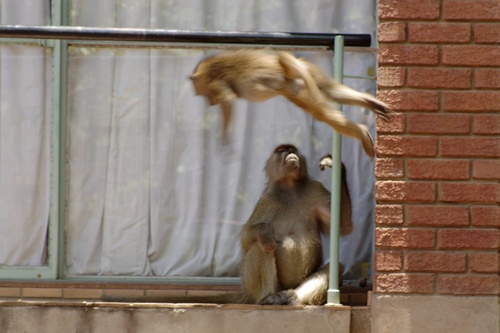
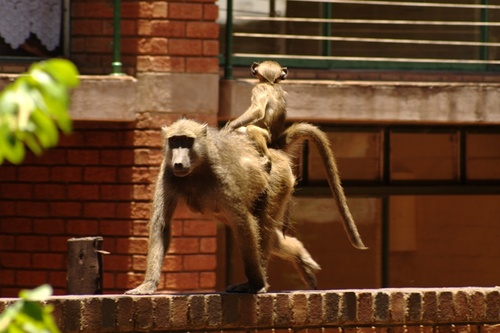
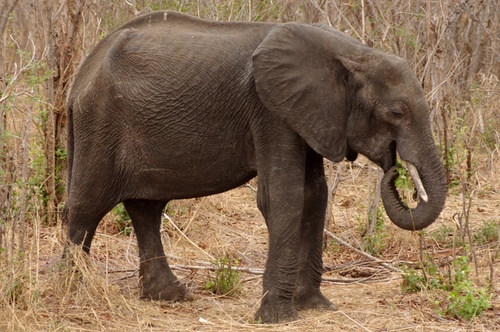
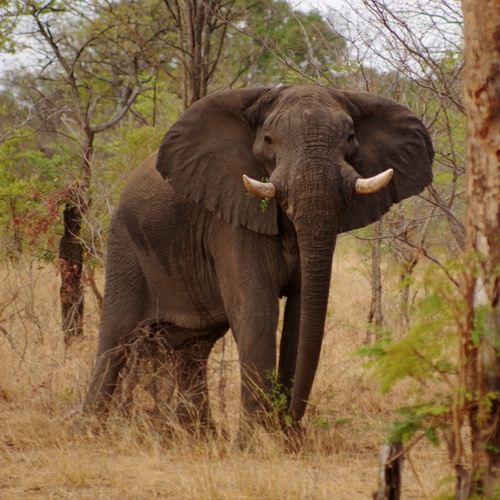
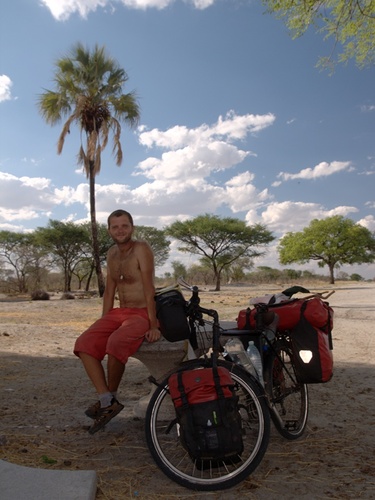
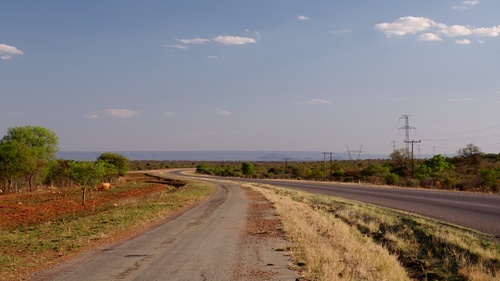
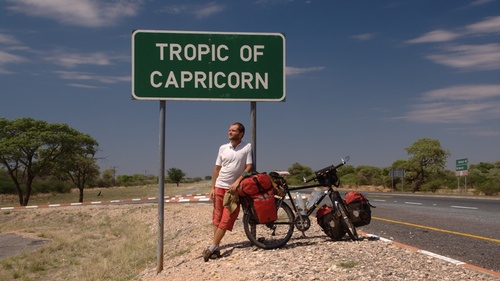
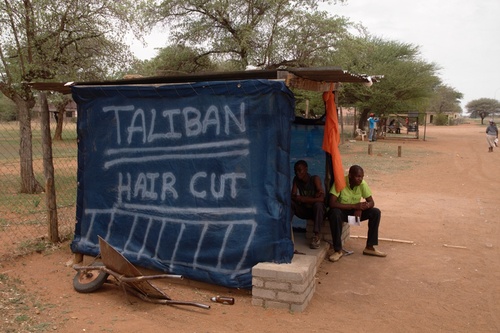
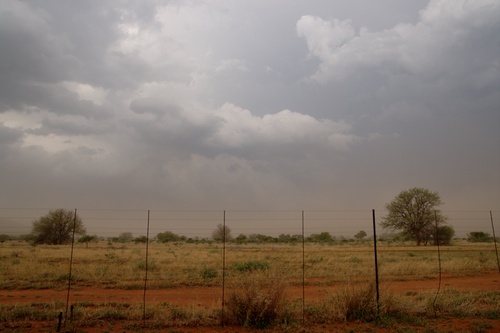
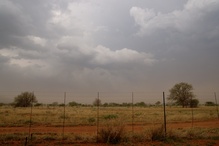
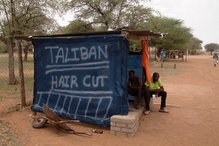
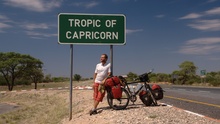
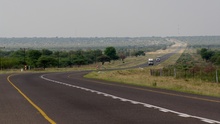
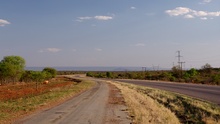
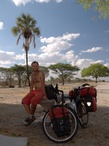
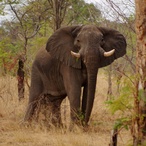
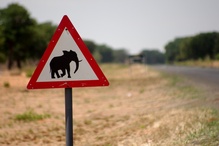
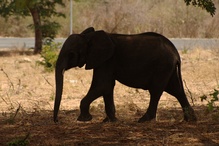
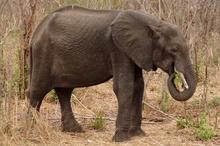
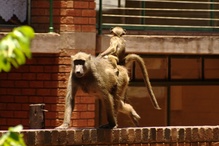
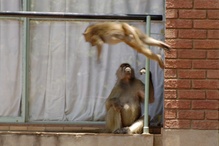
Comments:
iwo
Ile mają spodenki?
mama
yves
ws
siostra
Franek
Okolo 10 rano mial wyruszyc na nastepny etap do Ventersdorp,a nastepnego dnia w kierunku Kronstad i do Lesotho.
Wspanialy chlopak.Dla mnie i mojej zony byly to cudowne chwile poznania i bycia razem w RPA z prawdziwym Polakiem
podróże blog
Arkosław